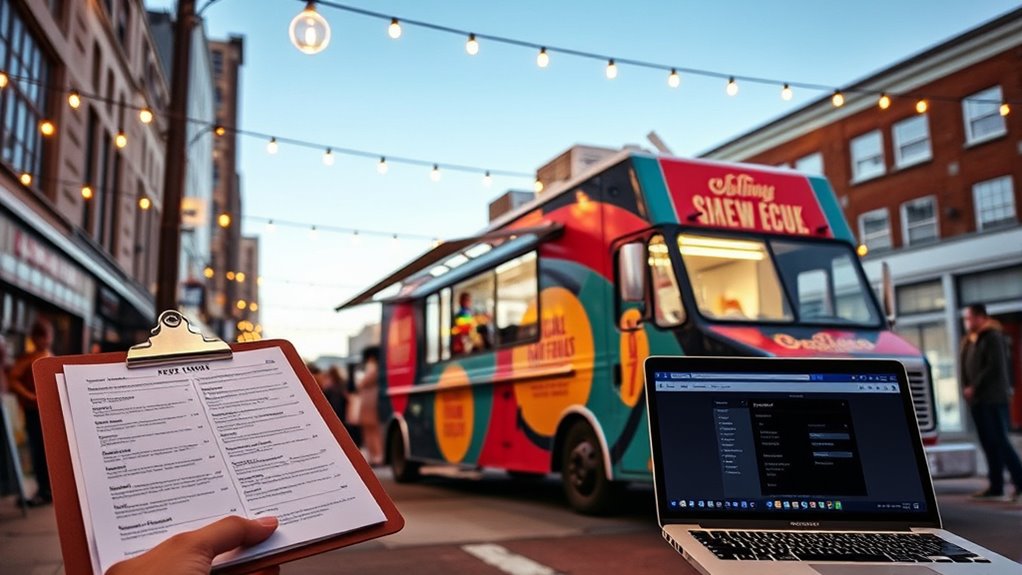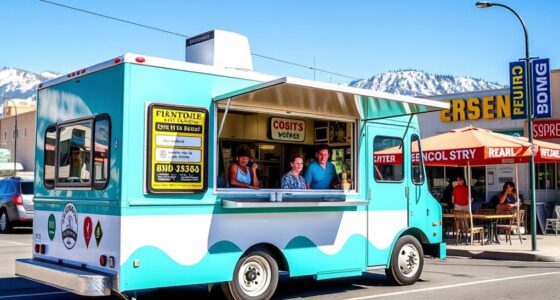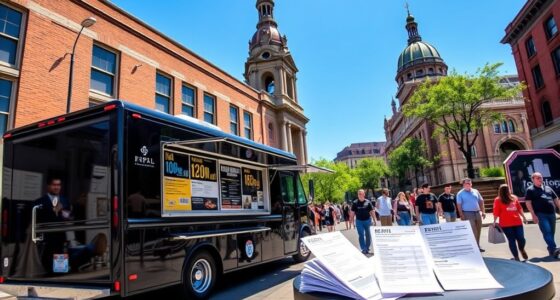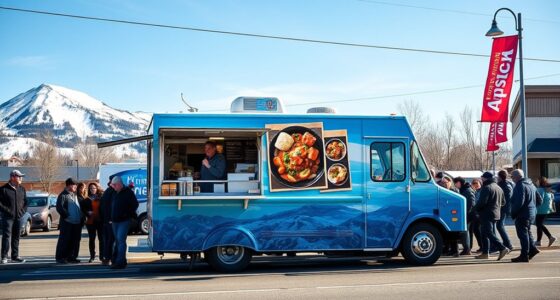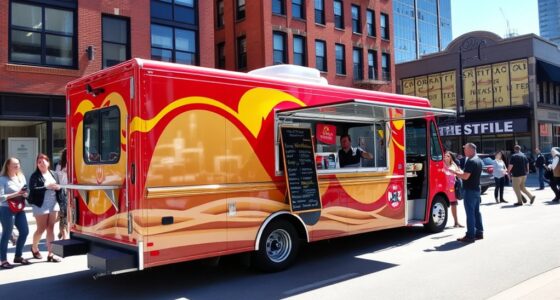To start your food truck in Nashua, you need to secure essential permits like the Mobile Food Service License and Hawkers Permit, pass fire safety inspections, and guarantee compliance with health standards. Budget $85,000 to $175,000 for a fully equipped truck or $35,000 to $60,000 for used options, plus monthly costs like commissary rent and insurance. Choose high-foot-traffic locations and develop a popular, compliant menu. Continue exploring to discover more tips for success in Nashua’s vibrant food scene.
Key Takeaways
- Obtain necessary permits including Nashua’s Mobile Food Service License, Hawkers and Peddlers Permit, and parking zone permits.
- Budget $85,000–$175,000 for new trucks or $35,000–$60,000 for used trucks, plus ongoing costs like licensing, supplies, and maintenance.
- Focus on high foot traffic areas such as Downtown Nashua and Riverwalk, ensuring compliance with zoning and safety regulations.
- Develop a safe, appealing menu with standardized recipes, including allergy-friendly and trendy options, aligned with FDA and local health standards.
- Use social media, participate in local events, and build community relationships to increase visibility and sustain long-term growth.
Navigating Local Permits and Licensing Requirements
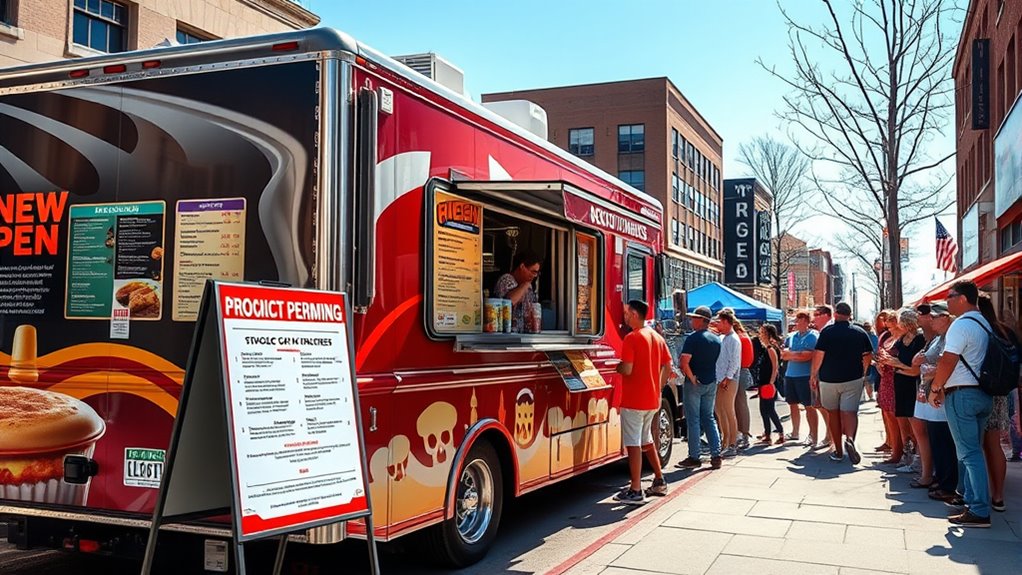
Finding your way through local permits and licensing requirements is a crucial step to legally operate a food truck in Nashua. You’ll need a Mobile Food Service License from the Environmental Health Department, which ensures your truck meets health and safety standards. Additionally, you’ll require a Hawkers and Peddlers Permit from the City Clerk’s Office for mobile vending. Before opening, a fire safety inspection by the Nashua Fire Marshal’s Office is mandatory. You must also submit a Mobile Food Service Vendor Application, along with a commissary agreement, confirming your kitchen setup. Your truck must operate from a licensed commissary kitchen, either inside Nashua or outside with proper documentation. Local requirements may vary; check with specific city or town authorities. Ensuring your vehicle complies with health and safety standards is essential to passing inspections and maintaining your license. Finally, parking permits are necessary if you plan to use public spaces, with fees ranging from $10 daily to $100 annually.
Understanding Costs and Budgeting for Your Food Truck Venture
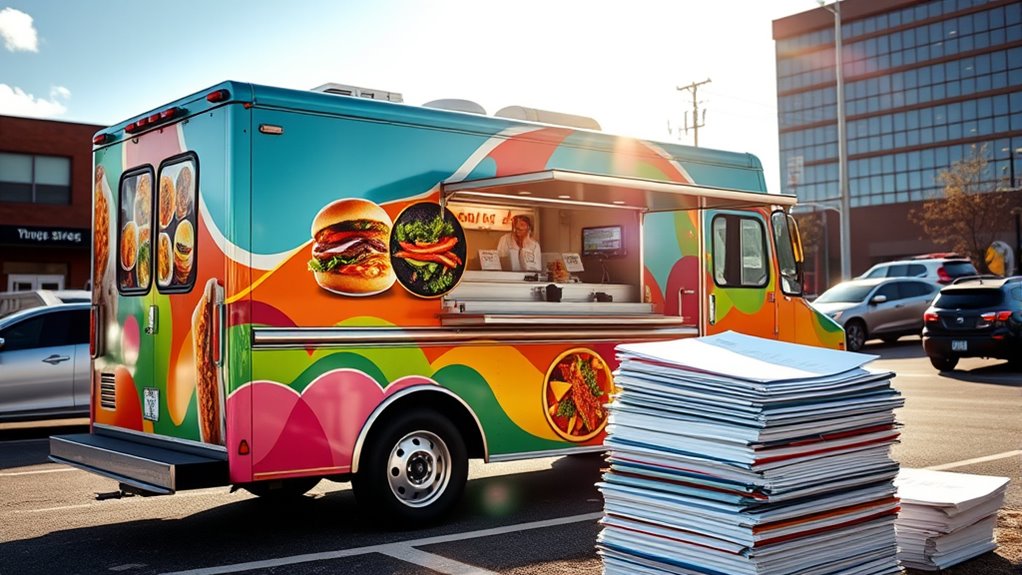
Understanding the costs involved in starting a food truck business is essential for creating a realistic budget and ensuring your venture’s success. A new, fully equipped truck in New Hampshire costs between $85,000 and $175,000, depending on customization. Buying used can lower initial costs to $35,000–$60,000, often without equipment. Outfitting the truck with necessary cooking and operational equipment usually costs $50,000–$60,000. Renting a truck is a more affordable option for startups. Expect additional startup expenses like initial inventory, licenses, and supplies, totaling $10,000–$30,000. Monthly costs include commissary rentals ($400–$1,200), waste disposal ($500–$1,000), seasonal heating ($400–$900), and fuel, maintenance, and insurance. Proper budgeting helps you allocate funds efficiently and plan for ongoing expenses. Additionally, understanding fetal development stages can assist in planning your business around personal schedules and health considerations.
Selecting Prime Locations and Parking Options in Nashua
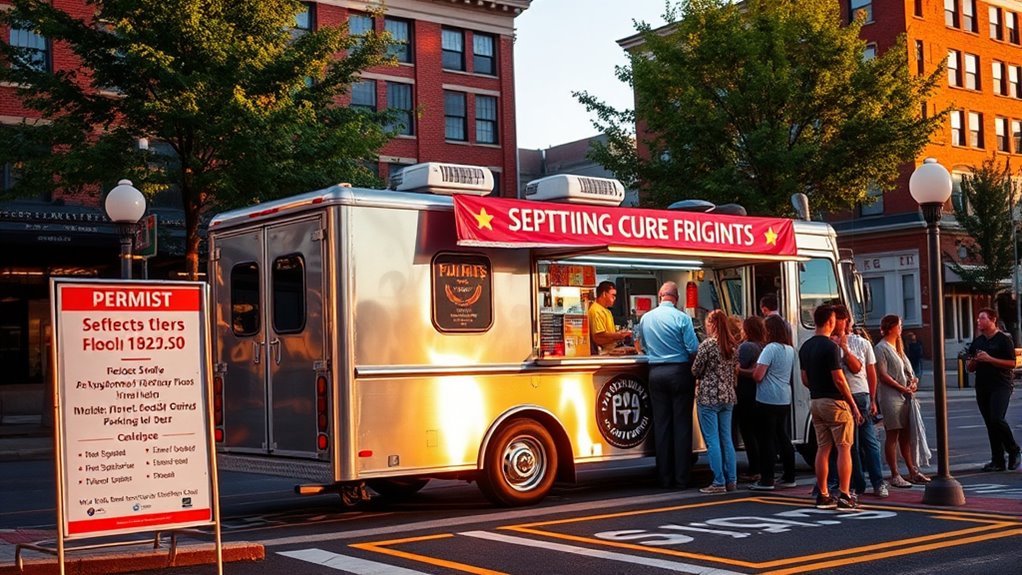
Choosing the right location in Nashua is essential for your food truck’s success, but you need to understand the designated vending zones and parking rules. You’ll need permits and permission from property owners to operate legally in popular spots like downtown or parks. By focusing on strategic placement within these regulations, you can maximize foot traffic and stay compliant. Incorporating community engagement through local events and storytelling can also boost visibility and attract more customers.
Designated Vending Zones
Have you considered how Nashua’s city regulations and strategic location choices influence where food trucks can operate? While specific designated vending zones aren’t detailed in city resources, approved public areas generally depend on permit terms. The Environmental Health Department reviews potential vending locations during the Mobile Food Service License process. Prime spots are often selected based on high foot traffic, proximity to events, parks, or business districts. You’ll need to coordinate with city planners or economic development offices to confirm approved zones, especially downtown. Operating on sidewalks or public spaces is possible with proper permits and safety inspections. Many vendors also use private lots or event spaces during permitted times, giving you flexibility while adhering to local zoning and safety standards. designated vending zones are crucial for ensuring compliance and maximizing customer visibility.
Parking Regulations and Permits
To operate legally and attract customers, you need to be strategic about parking your food truck in Nashua. First, obtain a Mobile Food Service License from the Nashua Environmental Health Department and a Hawkers and Peddlers Permit from the City Clerk’s office. If parking in metered or time-limited spaces, secure a parking encumbrance permit from Nashua police, which must be displayed during operation. You can’t idle your vehicle for more than five minutes, and parking must be in legal, fully self-contained spaces aligned with city regulations. Avoid residential neighborhoods unless invited for private events, and only park in designated commercial zones or approved private lots. Fees for permits range from $10 daily to $100 annually, plus additional costs for parking permits and licenses. Additionally, understanding micro-mobility options can be beneficial for last-mile customer access and operational flexibility.
Strategic Location Placement
Identifying the right locations is essential for maximizing your food truck’s visibility and sales in Nashua. Focus on high foot traffic areas like Downtown Nashua, Nashua Riverwalk, and Main Street, which attract locals and tourists alike. Parking near corporate parks and business districts helps capture the lunchtime crowd seeking quick bites. Positioning near community events, festivals, or sports venues boosts customer volume during peak times. Make sure your truck is visible from main roads, ideally on corner lots or open plazas, for easy access and impulse stops. Partnering with nearby businesses, breweries, or event organizers creates synergies that increase sales. Choose locations that reflect local demographics—families, students, office workers—and monitor emerging neighborhoods for future growth opportunities. Researching popular local spots and events ensures your truck is strategically placed for maximum exposure. Additionally, understanding local tuning vehicle trends can help tailor your marketing to attract a broader audience.
Crafting a Compliant and Appealing Menu
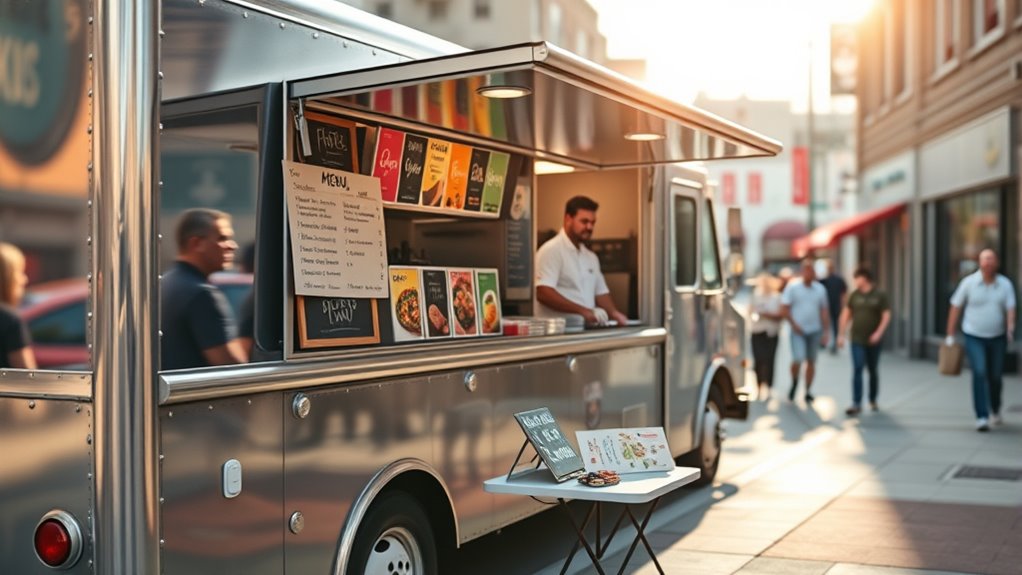
When crafting your menu, focus on selecting items that meet safety standards and are easy to prepare within your truck’s limited space. Prioritize simple, quick-serve dishes that comply with local regulations, like those from the FDA Food Code, and consider ingredients that are safe to store and handle. By balancing safety with customer appeal, you’ll create a menu that’s both compliant and enticing. Additionally, ensure that all ingredients used are properly stored at appropriate temperatures to prevent foodborne illnesses, which is a key aspect of food safety regulations. Utilizing proper storage practices can further help maintain ingredient quality and safety standards.
Menu Item Selection Strategies
Crafting a menu for your Nashua food truck involves balancing customer preferences with operational realities. You should include popular staples alongside unique specialties to appeal to diverse tastes. Offering vegetarian, vegan, gluten-free, and allergen-aware options guarantees inclusivity and meets local regulations. Keep your menu streamlined to maintain quick service and food quality, avoiding overwhelming your limited space. Incorporate seasonal ingredients to boost freshness and control costs, while considering trending or culturally relevant foods for the Nashua demographic. Guarantee all items comply with New Hampshire health standards, including accurate ingredient labeling and allergen info. Use standardized recipes for consistency and efficient preparation. Focus on dishes that are easy to prepare, quick to serve, and align with your brand identity, creating an appealing, compliant, and operationally feasible menu. Additionally, understanding customer preferences allows you to tailor your offerings effectively, increasing customer satisfaction and loyalty.
Food Safety and Preparation
Ensuring your Nashua food truck complies with food safety and preparation regulations is essential for both legal operation and customer trust. You need to follow the 2017 FDA Food Code as adopted locally, obtain a Nashua Mobile Food Service License and a Hawkers and Peddlers Permit, and pass fire safety inspections for wiring, gas, and ventilation. Your operations must be linked to a licensed commissary kitchen where food prep, cleaning, and waste disposal occur. Additionally, staff should have food safety certifications like ServSafe. To keep everything compliant:
- Submit a commissary agreement and undergo a plan review.
- Prepare and store food under strict sanitary conditions, maintaining proper temperatures.
- Regularly clean surfaces, utensils, and equipment to prevent contamination and ensure safety.
Proper sanitation practices are vital for maintaining food safety standards and avoiding health violations.
Effective Marketing Strategies for Food Truck Success
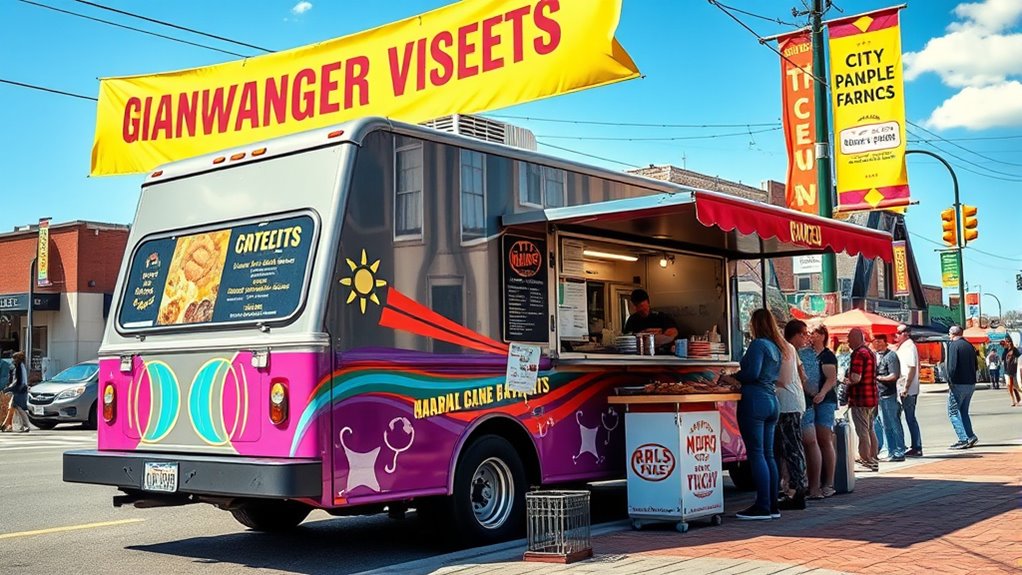
Effective marketing is essential for food trucks to stand out in a competitive landscape and attract steady customers. Leveraging social media, especially Facebook, can boost your visibility—68% of food trucks use it regularly, and campaigns can increase sales by 20%. Engaging actively on social media also encourages customers to spend about 15% more per visit, with 40% discovering trucks through these platforms. Participating in local events and festivals exposes your truck to diverse crowds, fostering word-of-mouth and brand loyalty. Building customer loyalty through reward programs and email marketing can increase repeat visits by 30%. Using mobile apps and data analytics improves location targeting and service efficiency, ensuring your marketing efforts maximize reach and revenue. Over 50% of food trucks have implemented loyalty programs, which directly contribute to a 30% increase in repeat visits. Incorporating customer feedback into your marketing strategy helps tailor your offerings and build stronger community connections. Focus on these strategies to grow your Nashua food truck business effectively.
Ensuring Food Safety and Operational Compliance
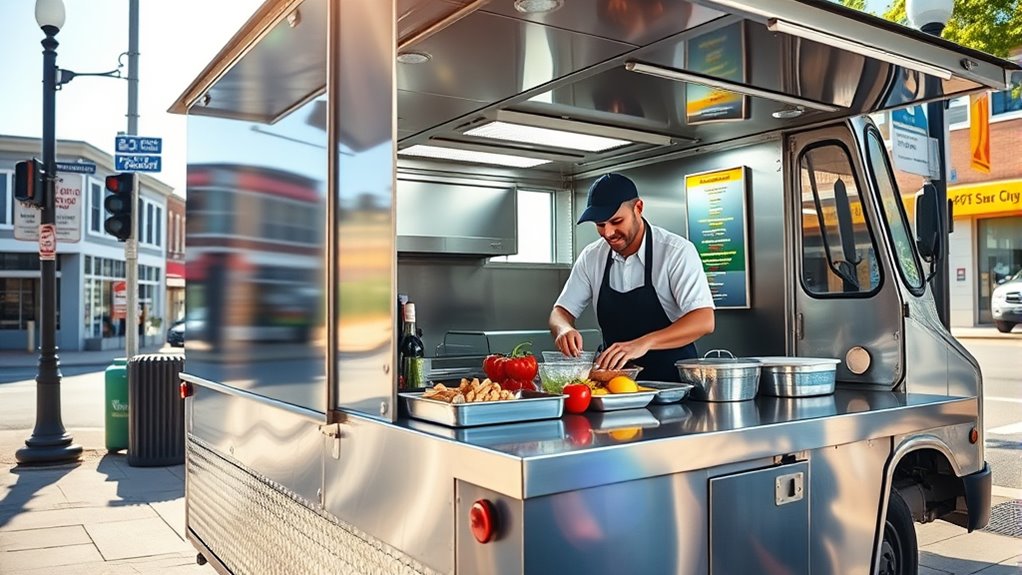
Maintaining strict food safety and operational compliance is essential for your Nashua food truck’s success and reputation. To stay compliant, you need to secure the necessary licenses and permits, such as the Nashua Mobile Food Service License, Hawkers and Peddlers Permit, and a fire safety inspection.
Here are three key steps to ensure safety and compliance:
- Follow health codes and store food in licensed commissaries, with proper temperature controls and sanitation practices.
- Prepare for inspections by the Environmental Health Department and Fire Marshall, maintaining cleanliness, safety equipment, and accurate records.
- Manage waste and pest control effectively, using approved disposal methods and environmentally friendly serviceware.
Staying diligent in these areas prevents violations, ensures safety, and keeps your truck operating smoothly.
Tips for Long-Term Growth and Community Engagement
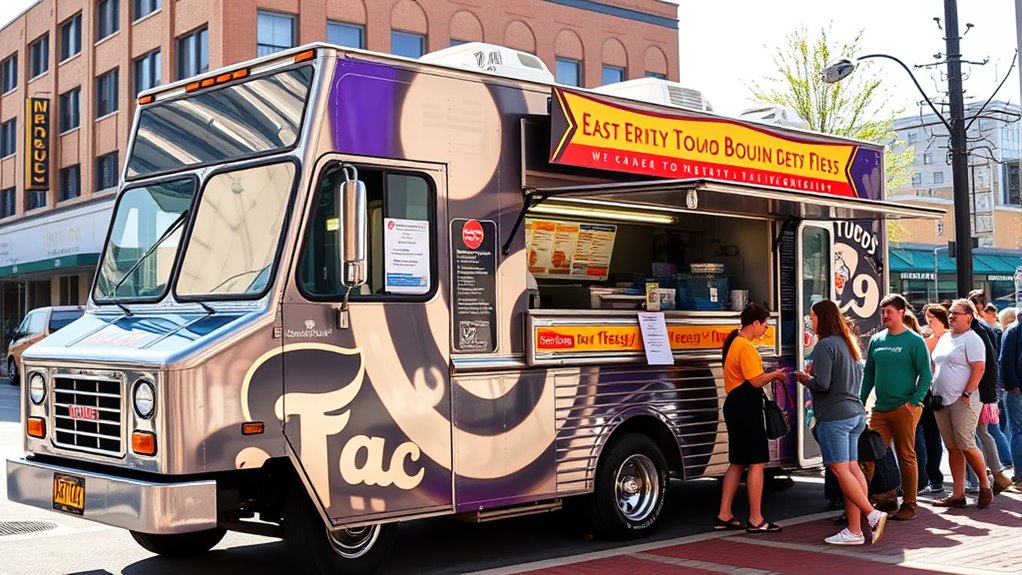
Building long-term growth and deepening community engagement are essential for your Nashua food truck’s continued success. Focus on delivering high-quality, fresh menu items that adapt to trends, like healthier or plant-based options, to keep customers coming back. Implement loyalty programs that reward repeat visits and promote consistent service hours with clear social media updates to build trust. Encourage customer feedback and respond promptly to improve satisfaction. Participate in local festivals, markets, and events to boost visibility and forge community ties. Collaborate with local farms and businesses to promote sustainability. Diversify your menu with seasonal, dietary-specific options, and consider offering catering or private events. Use social media actively, analyze sales data, and stay flexible to optimize locations, hours, and growth opportunities.
Frequently Asked Questions
Can I Operate My Food Truck on Private Property Without City Permits?
You can’t operate your food truck on private property without city permits. Nashua requires a Mobile Food Service License, a Hawkers and Peddlers Permit, and a fire safety inspection, regardless of location. Even on private property, you must have these licenses and conform with health and safety regulations. Operating without permits can lead to fines and legal issues, so ensure you obtain all necessary approvals before starting your food truck business.
Are There Restrictions on Selling Alcohol From a Mobile Food Truck in Nashua?
Think of your mobile food truck as a vessel steering a sea of regulations. Selling alcohol in Nashua isn’t a free-for-all; it’s locked behind a gate of licenses and permits. You need to chart a course through state liquor laws, city ordinances, and safety inspections. Without proper paperwork, your alcohol sales can hit rocky waters—fines, permit revocations, or legal trouble—so follow the rules closely to keep your ship sailing smoothly.
How Do I Handle Permit Renewals and Ongoing Compliance Requirements?
You need to stay on top of permit renewals and ongoing compliance to keep your food truck legal. Submit renewal applications before your licenses expire, including any updated documentation. Pay the required fees, like the $200 mobile food permit and $100 hawkers permit. Schedule annual fire and health inspections, cooperate with inspectors, and promptly report changes in ownership, contact info, or operations. Staying proactive guarantees you avoid fines or permit suspensions.
Is There a Limit to the Number of Food Trucks Allowed at Events or Locations?
Think of Nashua’s food scene as a bustling marketplace in a classic novel—full of energy but with limits. Generally, there’s no fixed cap on the number of trucks at events or locations. However, city permits, fire safety rules, zoning laws, and event-specific restrictions can practically restrict how many trucks can operate in a given spot. Event organizers and property owners also set their own caps to control crowding and ensure safety.
What Insurance Coverage Is Recommended for Mobile Food Vending in Nashua?
You should consider several insurance coverages for your mobile food vending business in Nashua. General liability protects against customer injuries or property damage, while commercial auto insurance is essential for your vehicle. If you serve alcohol, get liquor liability coverage. Protect your equipment with tools and equipment coverage, and consider products and completed operations insurance for food-related claims. Having these in place helps you meet event requirements and manage risks effectively.
Conclusion
Starting a food truck in Nashua is a smart move, especially since the city hosts over 20 food truck festivals each year. With the right permits, a budget plan, and a standout menu, you can tap into this vibrant scene. Remember, successful trucks see an average annual revenue of $250,000. So, stay compliant, engage with your community, and turn your passion into a thriving business on wheels.
